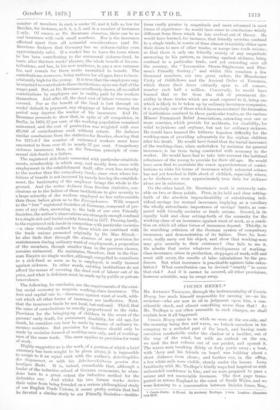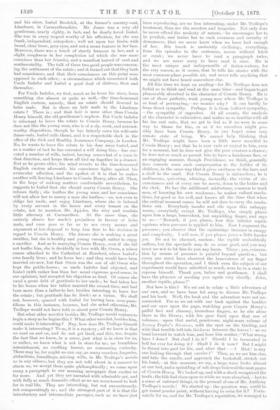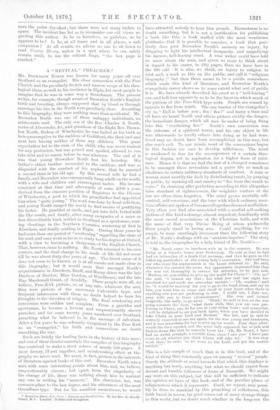COUSIN HENRY.* Mn. ANTHONY Tion,Lorz, through the instrumentality of Cousin
Henry, has made himself responsible for causing us—US his reviewer—who are now to sit in judgment upon him, a con- siderable shock, and almost something worse than that I As Mr. Trollope is not often amenable to such charges, we shall explain how it all happened.
Cousin Irenry came to us while we were at the sea-side, and the morning being fine and warm, we betook ourselves in his company to a secluded part of the beach, and having made ourselves comfortable under the shadow of a boulder, out of tbo way of the wind, but with an outlook on the sea, we took the first volume out of our pocket, and opened it. The waves were breaking thirty or forty yards away ; a boat, with 'Arry and his friends on board was 'bobbing about a short distance from shore ; and further out, in the offing, a few white sails were visible, steady under the breeze. Long familiarity with Mr. Trollope's kindly ways had inspired us with unbounded confidence in him, and we were prepared to pass a serene and not unenviable forenoon. The first page trans- ported us across England to the coast of South Wales, and we wore listening to a conversation between Indefer Jones, Esq., « Cousin Henry. A Novel. By Anthony Trollope. 2 vole. London: Chapman and Nall. and his niece, Isabel Brodrick, at the former's country-seat, Llanfeare, in Carmarthenehire. Mr. Jones was a very old gentleman, nearly eighty, in fact, and he dearly loved Isabel. She was in every respect worthy of his affection, for she was frank, independent, outspoken ; well set upon her limbs, with broad, clear brow, grey eyes, and not a mean feature in her face. Moreover, there was a touch of sturdy humour in her, and a slight roughness in her complexion (of which she was more ,conscious than her friends), and a manifest hatred of cant and sentimentality. The talk of these two good people was concern- ing the settlement of the estate; and it turned out that they both had consciences, and that their consciences on this point wore opposed to each other,—a circumstance which occasioned both Uncle Indefer and Isabel a good deal of distress, then and thereafter.
For Uncle Indefer, we find, much as he loves hie niece, loves something else almost or quite as well,—the time-honoured English custom, namely, that an estate should descend to heirs male. But is there an heir male to the Llanfeare .estate ? There is ; and that heir is none other than Cousin Henry himself, the old gentleman's nephew. But Uncle Indefer is reluctant to leave the estate to Cousin Henry, because he -does not like the young man, who is of a sly, weak, and untrust- worthy disposition, though he has latterly sown his wild-oats .(tame-oats, Isabel calls them), and is a respectable clerk in the office of the Sick and Healthy Assurance Company, in London. No, he wants to leave the estate to his dear niece Isabel, and as a matter of fact he has executed a will doing this,—has exe- cuted a number of wills, indeed, having somewhat of a craze in that direction, and keeps them all tied up together in a drawer. But as he grows older, his mind reverts to the time-honoured English custom aforesaid; his conscience fights against his .avuncular affection, and the upshot of it is that he makes another will, leaving Llanfeare to Cousin Henry, after all. Then, in the hope of making matters comfortable nevertheless, he suggests to Isabel that she should marry Cousin Henry. She refuses flatly ; she loathes the young man, and her conscience will not allow her to marry a man she loathes,—no, not even to .oblige her uncle, and enjoy Llanfeare, where she is beloved by every servant in the house and every tenant on the .estate, not to . mention Mr. Apjohn, the wiry and resolute little attorney at Carmarthen. At the saine time, she entirely shares her uncle's prejudices in favour of heirs male, and oven goes so far as to use every means and argument at her disposal to keep him firm to his decision in regard to Cousin Henry. She knows she is making a great sacrifice, but she is healthy and young enough rather to enjoy .a sacrifice. And as to marrying Cousin Henry, even if she did not loathe him, she is decidedly in love with Mr. Owen, a minor -canon attached to the Cathedral at Hereford, where Isabel'e own family lives ; and he loves her ; and they would have been married ere now, but that Owen was the son of old Owen who kept the public-house ; so uncle Indefer had objected, and Isabel (with rather less than her usual vigorous good-sense, in our opinion), had accepted his objection as final. Of course he owed a great debt of. gratitude to her uncle ; he had taken her to his house when her father married the second time, and had :been more than a father to her, besides intending to leave her the estate ; but gratitude has its limit, as a virtue. We shall not, however, quarrel with Isabel for having been over-punc- tilious in this instance, because, had she acted otherwise, Mr. Trollope would not have told us about poor Cousin Henry.
But what other novelist besides Mr. Trollope would venture to begin a story as he begins this P What other novelist, besides him, -could make it interesting ? Nay, how does Mr. Trollope himself make it interesting ? To us, it is a mystery ; all we know is that we read on and on, and. do not get tired, and this, too, despite the fact that we know, in a sense, just what is in store for us, ur rather, we know what is not in store for us ; no breathless astonishment, no curdling horror, no consuming curiosity. There may be, for aught we can say, as many murders, forgeries, abductions, foundlings, missing wills, in Mr. Trollope's novels as in any others ; but they are not told about in a manner to alarm us, we accept them quite philosophically ; we come upon many a paragraph in our morning newspaper that excites us far more. And yet they are narrated with admirable art, and with fully as much dramatic effect as we are accustomed to look for in real life. They are interesting, but not uucourteously, not exasperatingly so ; and the strangest part of it is that the introductory and intermediate passages, such as we have just been reproducing, are no less interesting, under Mr. Trollope's treatment, than are the murders and forgeries. Not only does be never offend the modesty of nature,—he encourages her to be prudish, and trains her to such evenness and serenity of demeanour, that we never know when we have had enough of her. His touch is eminently civ ilisiug; everything, from the episodes to the sentences, moves without hitch or creak ; we never have to read a paragraph twice, and we are never sorry to have read it once. He is the most unique and indispensable of fiction-writers, for the very reason, as it seems, that he tells his stories with the most common-place possible air, and never tells anything that we might not have heard somewhere else.
All this time we kept on reading—for Mr. Trollope does not forbid us to think and read at the same time—and began to get pleasurably absorbed in the character of Cousin Henry. He is one of those pathetic, weak young men whom Mr. Trollope is so fond of portraying,—we wonder why ? It can hardly be from direct sympathy. Perhaps it is from indirect sympathy, —the sympathy of opposites. At all events, the analysis of the character is exhaustive, and makes us so familiar with all his ins and outs, that we get to feel as if we were in some way to blame for him, or as if we ourselves might pos- sibly have been Cousin Henry, in (we hope) some very remote state of being. 'We cannot help thinking that Mr. Trollope might have been a little more merciful to Cousin Henry ; not that he is ever rude or unjust to him, even for a moment, but he does not give the poor creature a chance ; he does not so much as permit him to have a handsome face, or an engaging manner, though Providence, we think, generally does concede some such compensation to the feebler of its children, in the same way that it gives swiftness to the hare and a shell to the snail. But Cousin Henry is defenceless ; he is molluscous, quivering, whining, dastardly, the victim of cir- cumstances and of every one he meets, down to the butler and the clerk. He has the additional misfortune, common to weak men, of knowing his own weakness ; be makes valiant resolu- tions, for good or for evil, and knows all the time that when the critical moment comes he will not dare to carry the resolu- tions out. Everybody insults and sits upon this unhappy worm,—everybody except Mr. Trollope, who simply places upon him a large, benevolent, but unyielding finger, and says to us :—" Remark, if you please, how this inferior reptile squirms when pressure is applied to him. Now I augment the pressure ; you observe that the squirmings increase in energy and complexity. I will now, if you please, press a little harder yet. Do not be alarmed, madam ; the reptile undoubtedly suffers, but the spectacle may do us some good, and you may trust me not to let him do you any harm. There ; yes, eviscera- tion by means of pressure is painful beyond question ; but every one must have observed the benevolence of my finger throughout the operation, and I think even the subject of our experiment would have admitted as much, were he in a state to express himself. Thank you, ladies and gentlemen. I shall have the pleasure of meeting you again very shortly. John, another reptile, please !"
But how is this ? We set out to relate a little adventure of our OWD, and we have been led away to discuss Mr. Trollope and his book. Well, the book and the adventure were not un- connected. For as we sat with our back against the boulder and our eyes upon the page, watching poor Cousin Henry's pallid face and clammy, tremulous fingers, as he sits alone there in the library, with his gaze fixed upon that row of volumes,—upon that awful, ponderous, night-mare volume of Jemmy Taylor's Sermons, with the spot on the binding, and with that terrible tell-tale thickness between the leaves !—as we bend forward to watch him, and hear him mutter, "What wrong have I done ? But shall I do it ? Should I be tormented in hell for ever for doing it ? Shall I do it now ? But I might be thrust into gaol for life, and after that—? Hist ! is any one looking through that crevice ?" Then, as we see him rise, and take the candle, and approach the bookshelf, stretch out Ids haud,—at this moment, we say, a large wave broke almost at our feet, and a sprinkling of salt drops bedewed the neat pages of Cousin Henry. We looked up, and with a shock recognised the truth ; the tide had risen upon us while we were absorbed,—lost to a sense of outward things, in the perusal of one of Mr. Anthony Trollope's novels ! We started up ; the question was, could be get round yonder point, without having to swim for it ? Fortu- nately for us, and for Mr. Trollope's reputation, we managed to
turn the point dry-shod ; but there were not many inches to spare. The incident has led tui to reconsider our old views re- garding this author. Is he so harmless, so guileless, as be appears to be ? Is he, at all times and in all places, a safe companion? At all events, we advise no one to sit down to read Cousin Henry, unless in a spot where he can safely remain until, to use the critical lingo, " the last page is teached."




































 Previous page
Previous page